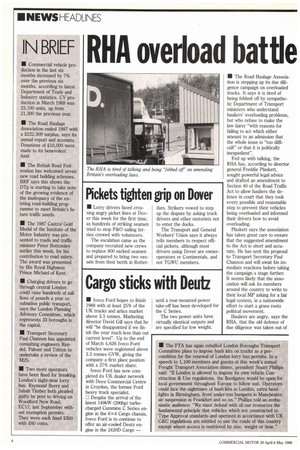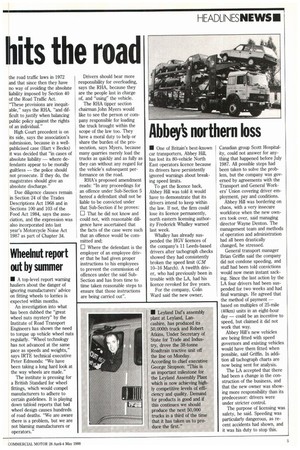RNA overload battle hits the road
Page 6

Page 7

If you've noticed an error in this article please click here to report it so we can fix it.
• The Road Haulage Association is stepping up its due diligence campaign on overloaded trucks. It says it is tired of being fobbed off by sympathetic Department of Transport ministers who understand hauliers' overloading problems, but who refuse to make the law fairer "with reasons for failing to act which either amount to an admission that the whole issue is "too difficult" or that it is politically inexpedient".
Fed up with talking, the RHA has, according to director general Freddie Plaskett, sought powerful legal advice and drafted an amendment to Section 40 of the Road Traffic Act to allow hauliers the defence in court that they took every possible and reasonable step to prevent their vehicles being overloaded and informed their drivers how to avoid overloading.
Plaskett says the association has taken great care to ensure that the suggested amendment to the Act is short and accurate. He has sent the proposal to Transport Secretary Paul Channon and will await his immediate reactions before taking the campaign a stage further. It seems likely that the association will ask its members around the country to write to their local MP asking for a fair legal system, in a nationwide effort to start a grass roots political movement.
Hauliers are angry, says the RHA, that the old defence of due diligence was taken out of the road traffic laws in 1972 and that since then they have no way of avoiding the absolute liability imposed by Section 40 of the Road Traffic Act. "These provisions are inequitable," says the RHA, "and difficult to justify when balancing public policy against the rights of an individual."
High Court precedent is on its side, says the association's submission, because in a wellpublicised case (Hart v Becks) it was decided that "in cases of absolute liability — where defendants appear to be morally guiltless — the police should not prosecute. If they do, the magistrates should give an absolute discharge."
Due diligence clauses remain in Section 24 of the Trades Descriptions Act 1968 and in Sections 100 and 103 of the Food Act 1984, says the association, and the expression was also incorporated into last year's Motorcycle Noise Act 1987 as part of Chapter 34. Drivers should bear more responsibility for overloading, says the RHA, because they are the people last in charge of, and "using" the vehicle.
The RHA tipper section chairman John Myers would like to see the person or company responsible for loading the truck brought within the scope of the law too. They have a moral duty to help or share the burden of the prosecution, says Myers, because many quarries merely load the trucks as quickly and as fully as they can without any regard for the vehicle's subsequent performance on the road.
RHA's proposed amendment reads: "In any proceedings for an offence under Sub-Section 5 hereof a defendant shall not be liable to be convicted under that Sub-Section if he proves: • That he did not know and could not, with reasonable diligence have ascertained that the facts of the case were such that an offence would be committed and; ▪ Where the defendant is the employer of an employee driver that he had given proper instructions to his employees to prevent the commission of offences under the said SubSection and has from time to time taken reasonable steps to ensure that those instructions are being carried out".




















































































































































